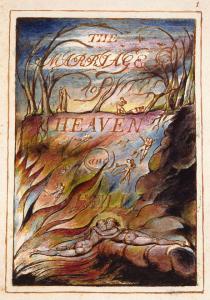
If Hell is other people, what is Heaven? Here I riff on a statement taken from Jean Paul Sartre’s play “No Exit” to reflect not only upon Hell, but also upon Heaven.
Jean Paul Sarte’s play “No Exit” is about three individuals trapped forever in Hell. They are confined to a room that is locked from the outside. They cannot close their eyes or escape one another’s apprehension and judgment. One of the characters laments at one point, “Hell Is Other People.” It is an oft-misunderstood statement. Sartre did not mean that all our relations are hellish, but that we judge ourselves based on others’ judgments of us. Here’s Sartre’s transcribed explanation taken from a recording made in 1965:
. . .“hell is other people” has always been misunderstood. It has been thought that what I meant by that was that our relations with other people are always poisoned, that they are invariably hellish relations. But what I really mean is something totally different. I mean that if relations with someone else are twisted, vitiated, then that other person can only be hell. Why? Because. . . when we think about ourselves, when we try to know ourselves, . . . we use the knowledge of us which other people already have. We judge ourselves with the means other people have and have given us for judging ourselves. Into whatever I say about myself someone else’s judgment always enters. Into whatever I feel within myself someone else’s judgment enters. . . . But that does not at all mean that one cannot have relations with other people. It simply brings out the capital importance of all other people for each one of us.
As one commentator on the play makes clear, there are no mirrors in Hell. The only way we come to perceive ourselves is through one another, that is, the “Other’s” distorted reflection or perception of us. Perhaps one could even say we are ‘trapped’ or ‘stuck’ in this web of judgments of one another and ourselves.
It is important that we try to perceive and interpret Sartre rightly. It is also important that we perceive and reflect upon one another and ourselves rightly. However, regardless of what Sartre argued, there is a very real sense in which our judgments of one another and ourselves are distorted and in turn easily distort us. Left to ourselves, our relations with one another could easily become hellish. This is especially the case if, as for Martin Luther, our sinful condition traps us in self-absorbed patterns of love, not unlike the demons in C.S. Lewis’s Screwtape Letters, which I discussed in a recent post. Luther writes of our sinful will: “It knows nothing but its own good, or what is good and honorable and useful for itself, but not what is good for God and other people. Therefore it knows and wills more what is particular, yes, only what is an individual good. And this is in agreement with Scripture, which describes man as so turned in on himself that he uses not only physical but even spiritual goods for his own purposes and in all things seeks only himself.” (Martin Luther, Lectures on Romans, trans. Jacob A. O. Preus and Walter Tillmanns, Vol. 25 in Luther’s Works. Edited by Hilton C. Oswald {Saint Louis: Concordia, 1972}, 345.)
Scripture teaches that Hell was made for the devil and his angels (Matthew 25:41), not humans. In contrast to Hell, which is locked inside from the human heart closed off to the God of second chances, the gates of Heaven always remain open (Revelation 21:25). God does not treat us as self-fulfilling prophecies. There is no condemnation for those who are in Christ Jesus (Romans 8:1).
Sartre was a devout atheist and did not believe in a literal Hell. Even so, whether there are mirrors in Hell, I am left to wonder if there are any mirrors in Heaven. Perhaps there is no need for mirrors if God’s view of us frames the narrative.
Perhaps Heaven is where we see one another rightly, where God’s perspective of us takes precedence and reframes our self-understanding and our understanding of our neighbor. Perhaps God even helps us see one another in ourselves, though not in a way that involves sinful, self-absorption. God alone sees rightly. God accounts for the whole of our lives in making judgments. Moreover, God sees those who look to Christ in Christ and not outside him. God brings love centered in Christ to bear upon the perception of us in a way that offers hope. Rather than become self-fulfilling prophecies where we falter and fail based on people’s negative projections of us, we rise to new heights as we no longer see others from a merely human point of view, but in Christ.
Here I call to mind the Apostle Paul’s words to the Corinthian church, which perceived God, Paul, and one another in very distorted ways:
So, from now on we regard no one from a worldly point of view. Though we once regarded Christ in this way, we do so no longer. Therefore, if anyone is in Christ, the new creation has come: The old has gone, the new is here! All this is from God, who reconciled us to himself through Christ and gave us the ministry of reconciliation: that God was reconciling the world to himself in Christ, not counting people’s sins against them. And he has committed to us the message of reconciliation. We are therefore Christ’s ambassadors, as though God were making his appeal through us. We implore you on Christ’s behalf: Be reconciled to God. God made him who had no sin to be sin for us, so that in him we might become the righteousness of God. (2 Corinthians 5:16-21; NIV)
In an earlier letter, he instructs the Corinthian church about how love leads us to perceive people rightly: “Love is patient, love is kind. It does not envy, it does not boast, it is not proud. It does not dishonor others, it is not self-seeking, it is not easily angered, it keeps no record of wrongs. Love does not delight in evil but rejoices with the truth. It always protects, always trusts, always hopes, always perseveres.” (1 Corinthians 14:4-7; NIV)
Sound perceptions and judgments do not ignore mistakes, faulty desires, and problematic relational patterns and behaviors. But when love enters, it reframes our perspective so that we do not become self-fulfilling prophecies leading to Hell. Rather than fixating on the errors, weaknesses, and sins of others and ourselves, love leads us to operate with hope and the expectation that better days are ahead.
Self-fulfilling prophecies that lead people to falter and fail cease when we look upon others and ourselves with a heavenly gaze. Such faulty perceptions are replaced by great expectations that we are made for more and that we will be raised immortal as glorious reflections of Christ Jesus, the ultimate image of God. If Hell involves distorted judgments leading to self-fulfilling prophecies and eternal death, Heaven is where God’s faithful, hopeful, and loving judgment in Christ Jesus brings us eternally new beginnings of life.














